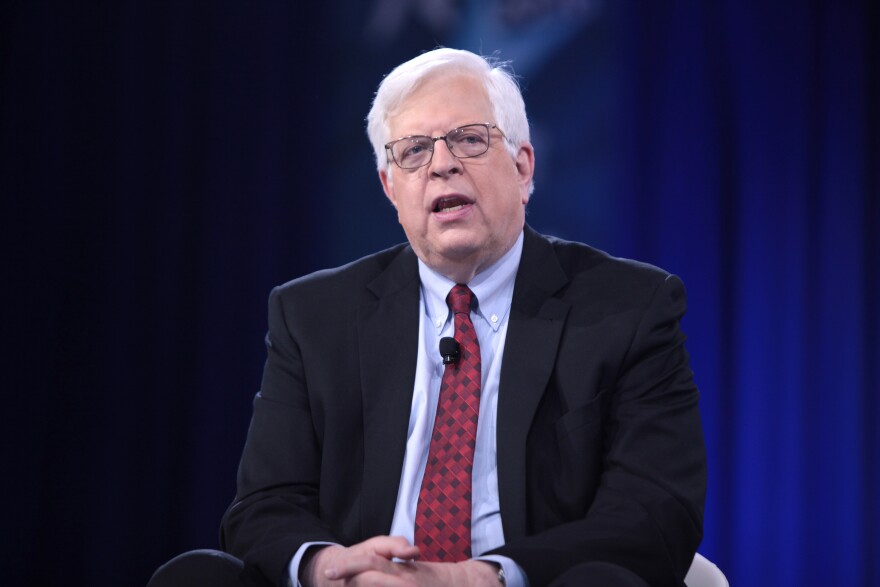Back in November, conservative radio talk show host Dennis Prager spoke to a packed audience at the University of Wyoming. After the applause died down a bit, he said, “I’m sure not all of you feel that enthusiastic about seeing me but nevertheless…”
And it was true. Many students weren’t enthusiastic for him to come, calling some of his talks racist and sexist. In fact, they argued university money shouldn’t be used to pay for such controversial speakers.
During his talk, Dennis Prager said there’s a crisis in America in which conservatives like him are being labeled unfairly by liberals.
“What they’re doing is they’re completely undermining the fight against real white supremacy, real misogyny, real xenophobia and real racism. That’s the irony. They are the worst source of the weakening of the battle against real evil by cheapening these things.”
Prager said, pretty soon there would be no vocabulary left for such evil. Later, though, he acknowledged there isn’t always agreement on what is evil.
“So if you have a uterus you can opine about abortion but what if you have the wrong opinion? What if you think most abortions are not moral? Did you lose your uterus? By the way, what would they do with the non-uterus owner who identifies as a woman? They’re truly transphobes.” The crowd laughed and burst into applause.
But it was comments like these that protesters said are offensive to some students and that student funds shouldn’t be spent on such speakers. But Associated Student’s of UW President Ben Wetzel said the conservative student group Turning Point USA followed the rules when they invited Prager. He said they only had to prove that the event would be “educational and enriching” to all students.
“Whether or not you agreed with the views of Mr. Prager, if you did it might be something you’d be interested in hearing,” he said. “And if you don’t agree with his views, it might be an opportunity for you to go and listen more about his point of view.”
But after Prager was long gone, the question remained, should the student organization have spent the $10,000 to bring such a controversial speaker?
It isn’t the first time the question has come up. Back in 2010, 1960s anti-war activist Bill Ayers was banned from speaking at UW after donors, politicians and others applied pressure to the university to drop him, even though the subject of his speech wasn’t controversial but rather about education reform. That time, the students sued, forcing the university to let him come. Ayers was a liberal visiting a conservative state. With Prager, the tables were turned.
The university debate team was among those arguing to constrain the free speech of a conservative speaker. So they challenged Turning Point USA, the conservative group that invited Prager, to a public debate. The group accepted. Last month, two teams faced off in front of a standing room only crowd.
During her rebuttal, recorded by Branding Iron reporter Matthew Green, Turning Point’s Jessica Leach said, “Again, we ask, who determines what is educational or virtuous dialogue? At a public institution, the first amendment encompasses all speech.”
Leach and her teammate argued that students learn a lot from the ideas that upset them most. On the other hand, UW’s debate team argued such opinions can truly injure already vulnerable groups. The two judges were split in who they felt won the debate, although they both felt the debate team was technically stronger.
But UW Debate Team Coach Travis Cram said the exercise was good in that both sides were forced to listen to each other.
“There is speech out there that doesn’t do anyone any good to hear,” he said. “How are we going to design sort of a set of policies that allows us to kind of like make sure the worst stuff stays out without chilling the effect of a free exchange of ideas. And that I think is a place where their eyes were opened the most.”
UW Board Trustee Michelle Sullivan was impressed by the general civility on campus over Prager’s visit. She wondered if Wyomingites learned the value of free speech from the Bill Ayers debacle.
“I think we as trustees have a responsibility to recognize that the university is a very important laboratory for young people as they begin to engage in their civic identities, to practice what it means to be a civil individual,” Sullivan said.
As far as students are concerned, ASUW President Ben Wetzel said they won’t shy away from bringing more controversial speakers in the future.
“Higher education is in my opinion really about having difficult conversations,” said Wetzel, “and trying to take your biases and put them aside and look at the facts.”
The UW debate team hopes to host more public debates on hot-button topics, on campus, and around the state, in coming months.










